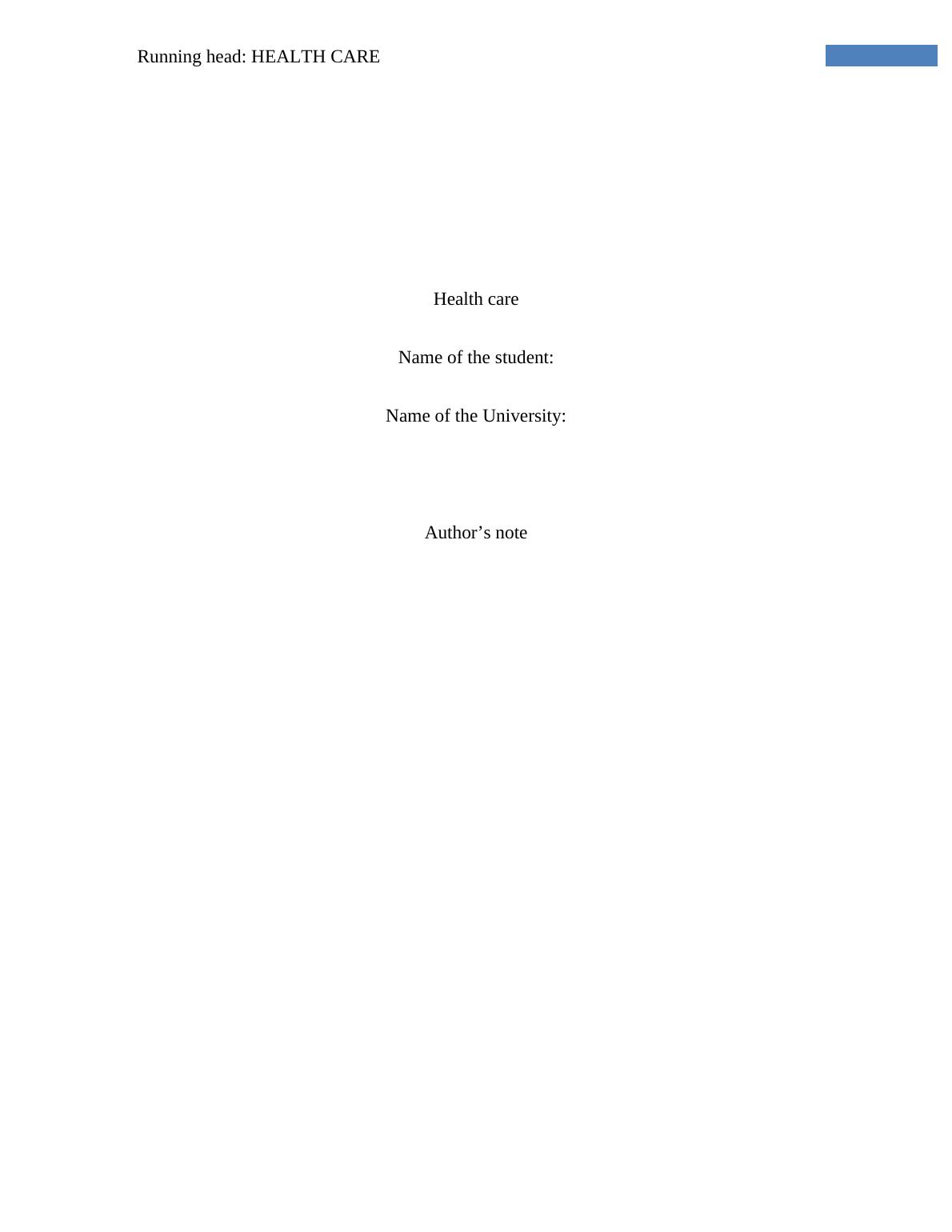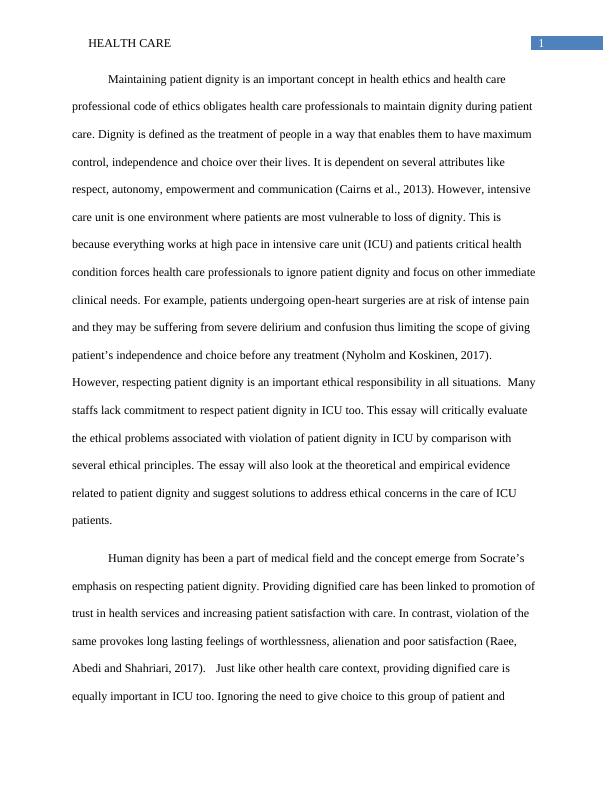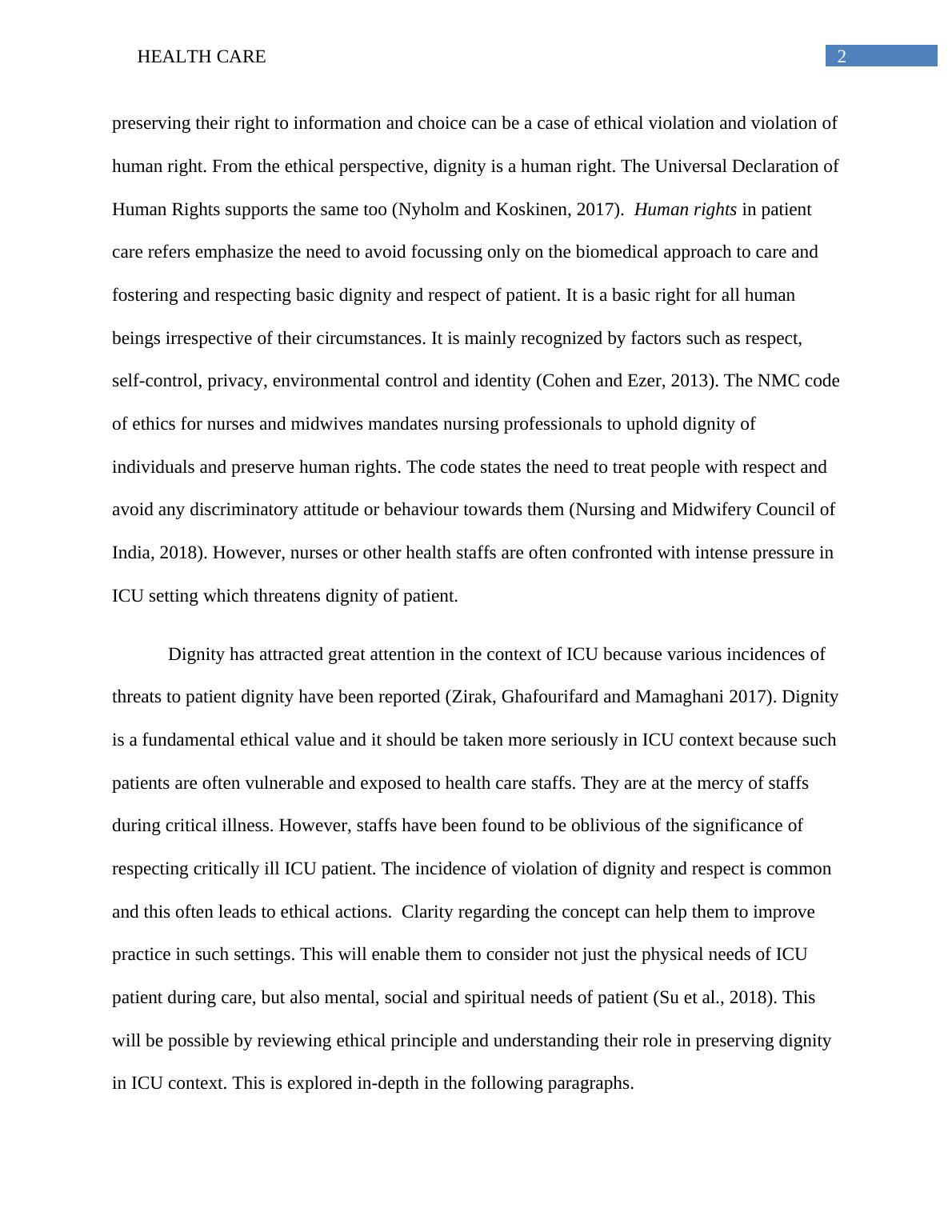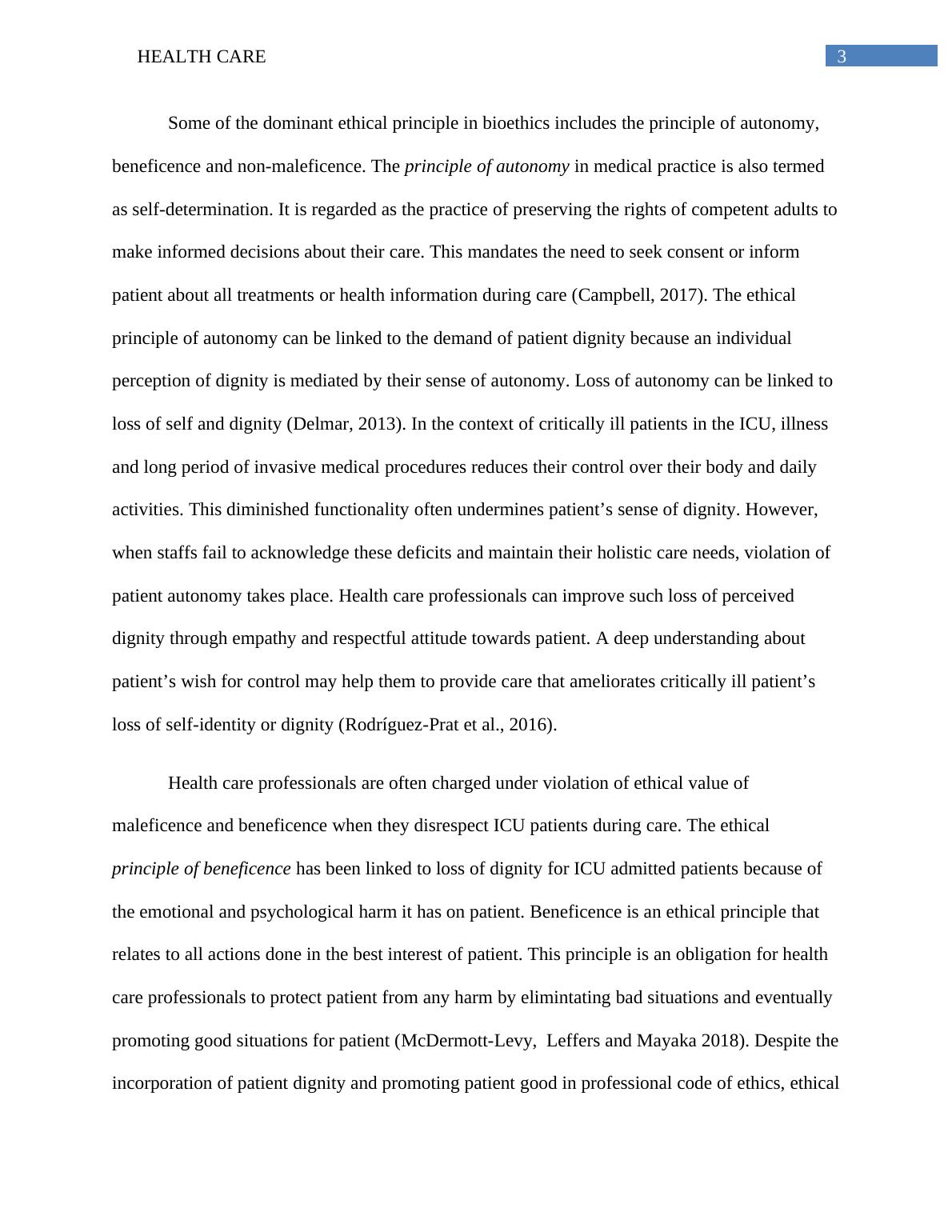Healthcare - Ethical Problems Associated With Patient Dignity in ICU
Added on 2022-08-18
13 Pages3726 Words14 Views
Running head: HEALTH CARE
Health care
Name of the student:
Name of the University:
Author’s note
Health care
Name of the student:
Name of the University:
Author’s note

1HEALTH CARE
Maintaining patient dignity is an important concept in health ethics and health care
professional code of ethics obligates health care professionals to maintain dignity during patient
care. Dignity is defined as the treatment of people in a way that enables them to have maximum
control, independence and choice over their lives. It is dependent on several attributes like
respect, autonomy, empowerment and communication (Cairns et al., 2013). However, intensive
care unit is one environment where patients are most vulnerable to loss of dignity. This is
because everything works at high pace in intensive care unit (ICU) and patients critical health
condition forces health care professionals to ignore patient dignity and focus on other immediate
clinical needs. For example, patients undergoing open-heart surgeries are at risk of intense pain
and they may be suffering from severe delirium and confusion thus limiting the scope of giving
patient’s independence and choice before any treatment (Nyholm and Koskinen, 2017).
However, respecting patient dignity is an important ethical responsibility in all situations. Many
staffs lack commitment to respect patient dignity in ICU too. This essay will critically evaluate
the ethical problems associated with violation of patient dignity in ICU by comparison with
several ethical principles. The essay will also look at the theoretical and empirical evidence
related to patient dignity and suggest solutions to address ethical concerns in the care of ICU
patients.
Human dignity has been a part of medical field and the concept emerge from Socrate’s
emphasis on respecting patient dignity. Providing dignified care has been linked to promotion of
trust in health services and increasing patient satisfaction with care. In contrast, violation of the
same provokes long lasting feelings of worthlessness, alienation and poor satisfaction (Raee,
Abedi and Shahriari, 2017). Just like other health care context, providing dignified care is
equally important in ICU too. Ignoring the need to give choice to this group of patient and
Maintaining patient dignity is an important concept in health ethics and health care
professional code of ethics obligates health care professionals to maintain dignity during patient
care. Dignity is defined as the treatment of people in a way that enables them to have maximum
control, independence and choice over their lives. It is dependent on several attributes like
respect, autonomy, empowerment and communication (Cairns et al., 2013). However, intensive
care unit is one environment where patients are most vulnerable to loss of dignity. This is
because everything works at high pace in intensive care unit (ICU) and patients critical health
condition forces health care professionals to ignore patient dignity and focus on other immediate
clinical needs. For example, patients undergoing open-heart surgeries are at risk of intense pain
and they may be suffering from severe delirium and confusion thus limiting the scope of giving
patient’s independence and choice before any treatment (Nyholm and Koskinen, 2017).
However, respecting patient dignity is an important ethical responsibility in all situations. Many
staffs lack commitment to respect patient dignity in ICU too. This essay will critically evaluate
the ethical problems associated with violation of patient dignity in ICU by comparison with
several ethical principles. The essay will also look at the theoretical and empirical evidence
related to patient dignity and suggest solutions to address ethical concerns in the care of ICU
patients.
Human dignity has been a part of medical field and the concept emerge from Socrate’s
emphasis on respecting patient dignity. Providing dignified care has been linked to promotion of
trust in health services and increasing patient satisfaction with care. In contrast, violation of the
same provokes long lasting feelings of worthlessness, alienation and poor satisfaction (Raee,
Abedi and Shahriari, 2017). Just like other health care context, providing dignified care is
equally important in ICU too. Ignoring the need to give choice to this group of patient and

2HEALTH CARE
preserving their right to information and choice can be a case of ethical violation and violation of
human right. From the ethical perspective, dignity is a human right. The Universal Declaration of
Human Rights supports the same too (Nyholm and Koskinen, 2017). Human rights in patient
care refers emphasize the need to avoid focussing only on the biomedical approach to care and
fostering and respecting basic dignity and respect of patient. It is a basic right for all human
beings irrespective of their circumstances. It is mainly recognized by factors such as respect,
self-control, privacy, environmental control and identity (Cohen and Ezer, 2013). The NMC code
of ethics for nurses and midwives mandates nursing professionals to uphold dignity of
individuals and preserve human rights. The code states the need to treat people with respect and
avoid any discriminatory attitude or behaviour towards them (Nursing and Midwifery Council of
India, 2018). However, nurses or other health staffs are often confronted with intense pressure in
ICU setting which threatens dignity of patient.
Dignity has attracted great attention in the context of ICU because various incidences of
threats to patient dignity have been reported (Zirak, Ghafourifard and Mamaghani 2017). Dignity
is a fundamental ethical value and it should be taken more seriously in ICU context because such
patients are often vulnerable and exposed to health care staffs. They are at the mercy of staffs
during critical illness. However, staffs have been found to be oblivious of the significance of
respecting critically ill ICU patient. The incidence of violation of dignity and respect is common
and this often leads to ethical actions. Clarity regarding the concept can help them to improve
practice in such settings. This will enable them to consider not just the physical needs of ICU
patient during care, but also mental, social and spiritual needs of patient (Su et al., 2018). This
will be possible by reviewing ethical principle and understanding their role in preserving dignity
in ICU context. This is explored in-depth in the following paragraphs.
preserving their right to information and choice can be a case of ethical violation and violation of
human right. From the ethical perspective, dignity is a human right. The Universal Declaration of
Human Rights supports the same too (Nyholm and Koskinen, 2017). Human rights in patient
care refers emphasize the need to avoid focussing only on the biomedical approach to care and
fostering and respecting basic dignity and respect of patient. It is a basic right for all human
beings irrespective of their circumstances. It is mainly recognized by factors such as respect,
self-control, privacy, environmental control and identity (Cohen and Ezer, 2013). The NMC code
of ethics for nurses and midwives mandates nursing professionals to uphold dignity of
individuals and preserve human rights. The code states the need to treat people with respect and
avoid any discriminatory attitude or behaviour towards them (Nursing and Midwifery Council of
India, 2018). However, nurses or other health staffs are often confronted with intense pressure in
ICU setting which threatens dignity of patient.
Dignity has attracted great attention in the context of ICU because various incidences of
threats to patient dignity have been reported (Zirak, Ghafourifard and Mamaghani 2017). Dignity
is a fundamental ethical value and it should be taken more seriously in ICU context because such
patients are often vulnerable and exposed to health care staffs. They are at the mercy of staffs
during critical illness. However, staffs have been found to be oblivious of the significance of
respecting critically ill ICU patient. The incidence of violation of dignity and respect is common
and this often leads to ethical actions. Clarity regarding the concept can help them to improve
practice in such settings. This will enable them to consider not just the physical needs of ICU
patient during care, but also mental, social and spiritual needs of patient (Su et al., 2018). This
will be possible by reviewing ethical principle and understanding their role in preserving dignity
in ICU context. This is explored in-depth in the following paragraphs.

3HEALTH CARE
Some of the dominant ethical principle in bioethics includes the principle of autonomy,
beneficence and non-maleficence. The principle of autonomy in medical practice is also termed
as self-determination. It is regarded as the practice of preserving the rights of competent adults to
make informed decisions about their care. This mandates the need to seek consent or inform
patient about all treatments or health information during care (Campbell, 2017). The ethical
principle of autonomy can be linked to the demand of patient dignity because an individual
perception of dignity is mediated by their sense of autonomy. Loss of autonomy can be linked to
loss of self and dignity (Delmar, 2013). In the context of critically ill patients in the ICU, illness
and long period of invasive medical procedures reduces their control over their body and daily
activities. This diminished functionality often undermines patient’s sense of dignity. However,
when staffs fail to acknowledge these deficits and maintain their holistic care needs, violation of
patient autonomy takes place. Health care professionals can improve such loss of perceived
dignity through empathy and respectful attitude towards patient. A deep understanding about
patient’s wish for control may help them to provide care that ameliorates critically ill patient’s
loss of self-identity or dignity (Rodríguez-Prat et al., 2016).
Health care professionals are often charged under violation of ethical value of
maleficence and beneficence when they disrespect ICU patients during care. The ethical
principle of beneficence has been linked to loss of dignity for ICU admitted patients because of
the emotional and psychological harm it has on patient. Beneficence is an ethical principle that
relates to all actions done in the best interest of patient. This principle is an obligation for health
care professionals to protect patient from any harm by elimintating bad situations and eventually
promoting good situations for patient (McDermott-Levy, Leffers and Mayaka 2018). Despite the
incorporation of patient dignity and promoting patient good in professional code of ethics, ethical
Some of the dominant ethical principle in bioethics includes the principle of autonomy,
beneficence and non-maleficence. The principle of autonomy in medical practice is also termed
as self-determination. It is regarded as the practice of preserving the rights of competent adults to
make informed decisions about their care. This mandates the need to seek consent or inform
patient about all treatments or health information during care (Campbell, 2017). The ethical
principle of autonomy can be linked to the demand of patient dignity because an individual
perception of dignity is mediated by their sense of autonomy. Loss of autonomy can be linked to
loss of self and dignity (Delmar, 2013). In the context of critically ill patients in the ICU, illness
and long period of invasive medical procedures reduces their control over their body and daily
activities. This diminished functionality often undermines patient’s sense of dignity. However,
when staffs fail to acknowledge these deficits and maintain their holistic care needs, violation of
patient autonomy takes place. Health care professionals can improve such loss of perceived
dignity through empathy and respectful attitude towards patient. A deep understanding about
patient’s wish for control may help them to provide care that ameliorates critically ill patient’s
loss of self-identity or dignity (Rodríguez-Prat et al., 2016).
Health care professionals are often charged under violation of ethical value of
maleficence and beneficence when they disrespect ICU patients during care. The ethical
principle of beneficence has been linked to loss of dignity for ICU admitted patients because of
the emotional and psychological harm it has on patient. Beneficence is an ethical principle that
relates to all actions done in the best interest of patient. This principle is an obligation for health
care professionals to protect patient from any harm by elimintating bad situations and eventually
promoting good situations for patient (McDermott-Levy, Leffers and Mayaka 2018). Despite the
incorporation of patient dignity and promoting patient good in professional code of ethics, ethical

End of preview
Want to access all the pages? Upload your documents or become a member.
Related Documents
Nursing Assignment | Aged Care Nursinglg...
|7
|1854
|152
Impact of Social Media on Heathlg...
|5
|878
|24
Ethical Issues in a Medical Settinglg...
|8
|2186
|260
Patient Dignity and Rights: A Nursing Perspective in Australialg...
|5
|1129
|374
Health care ethics Assignmentlg...
|9
|2413
|86
Health Care Ethics Assignment PDFlg...
|8
|1729
|108